A well-known fact: water is the source of all life on earth, and without it the human body cannot live even a day. But what should parents of babies do, who ask quite reasonable questions: is it possible to give a child water from the moment of his birth, or do you need to wait for some time? There is a lot of information on this subject, often different sources contradict each other and have no basis. In order not to harm the baby, parents should be guided in this matter by an authoritative opinion. World Health Organization (the famous WHO), which, together with the IDF (International Children's Fund) UN UNICEF, developed the program "Ten principles for successful breastfeeding» , which also spells out the rules of the drinking regime for the smallest inhabitants of our planet.
But sometimes they are bad. And when they do, it can also cause damage. The advice not to be followed in this case is a nipple with honey to give to babies. My mother made me an infinite head with these pearls of wisdom! If the baby cries so much and you don't want to give it every time you put it down, take a handkerchief, put some bread and honey inside, cover it all up and give it to the baby. He will stop and calm down. "Or if he refuses the honey-dipped nipple, he'll love it."
But he did not like to give honey to babies. Or, rather, it is better not to give honey to all children who did not turn off the first candle. Why? Because honey can contain bacteria that irritate the small intestine. In fact, this is a theme, for many years in scientific world there was a lot of debate. Some studies have shown how botulinum spores can be introduced into the body through honey, bacteria that can produce a dangerous toxin. In adults, as in children over one year old, this bacterium does not cause any problems.
At what age can a child be given water?
Age is the cornerstone of when you can give your child water, and this is where the document developed by WHO comes in handy. According to him and many leading pediatricians, age features children's drinking regimen are as follows.
- Newborns on breastfeeding
Newborns (these are babies who are from 1 day to 1 month old), who are breastfed, do not need water, unless there are special medical indications. Breast milk is food and at the same time an ideal drink for little man. At 87% it consists of water, so you do not need to be afraid of dehydration of the baby at this stage. Even in hot weather and when the child's temperature rises, you just need to breastfeed him more often, without even thinking about water.
The body has already reached the full function of digestion, so the spores are simply destroyed by the gastric juices. Or they don't find the proper breeding ground in the gut. Instead, in digestive system babies can survive, and once they reach the intestines, they multiply and develop amounts of the irritating toxin to the newborn.
A proposal that occurs simply because of the application of the precautionary principle. Therefore, parents can avoid panic attacks, but if they are especially wary, they can simply follow the honey jar ban. For example, it is ideal for sweetening milk. The recommended dose is two teaspoons per day. However, at the time of purchase, you should check that it is 100% Italian and that it was released soon. The fresher the honey, the more its properties are preserved. In addition to honey to get full energy, royal jelly, pollen and propolis are also great.
- Newborns without breastfeeding
Newborns who are initially on artificial feeding should receive water too. If the mixture they eat is of high quality, it contains a sufficient amount of liquid and there should be no problems with dehydration, which means that it is not necessary to introduce water into the baby's diet. However, even today it is quite difficult to find a high-quality mixture among the variety of proposals, so the pediatrician observing the baby may advise soldering the newborn with some water (no more than 50 ml per day). But this is in extreme, rather rare cases. It is imperative to give water to an artificial child if he has a fever, an intestinal infection is diagnosed. In these cases, the doctor himself can prescribe the appropriate drinking regimen for the baby. Do not forget to give water to the child also during walks in very hot weather.
Is it better than a tap or a bottle? Here are the answers from Alberto Villani, Head of the Comprehensive Unit of General Pediatrics and Infectious Diseases at the Bambino Gezu Hospital in Rome. In the first months of life, the baby does not need to drink water. In addition, it consists of over 95% water. For this reason, it is not necessary not to add more water, but it is also recommended that the child does not take other liquids in addition to milk until the first solid foods are introduced.
When should water be introduced?
In fact, it will likely fill the stomach unnecessarily, which will feed on a false sense of satiety and create bad habits. Thus, a small amount of water during meals may be offered to the child by the introduction of the fourth to sixth months, but this is not a requirement.
- Infants (from 2 months to six months)
Many mothers wonder if baby to give water or not, although life itself should tell them the answer to it. If there is enough breast milk and the baby has no deviations in health and development, it is not necessary to introduce water into the child's drinking regimen. If you really want to, wait at least 4 months, when the baby's digestive tract is already more or less formed. Offer him a teaspoon of water: if he refuses, then he does not need it. Drink - gradually increase the dosage, but do not exceed 60 ml per day. If the baby began to drink water, do not use bottles: drink him either from a spoon or from a cup so that he does not drop his breast. If the child is bottle-fed, during this period it must be drunk with water (from 60 to 100 ml per day).
What water is best for children to drink? This is good for any oligomineral water that guarantees the correct mineral content - non-effervescent, preferably glass bottles. However, if you live in areas where water stays in a box or is notoriously unreliable, then bottled water is fine. In case of doubt or need, the water can be boiled and after cooling, you can safely drink the baby.
Summer is better not to excommunicate? You can wean a child at any time of the year without exposing him to special risks. The old advice not to loosen it in the summer only had reason to be when there were no refrigerators: since it was difficult to store food, there was a real danger of managing small spoiled foods.
- Infants (from 6 months to a year)
Six months is the milestone that is a green signal for young parents that now the baby can fearlessly drink water and this must be done. It no longer matters whether your child is breastfed or bottle-fed. The body has grown up, and it needs life-giving moisture for the normal functioning and development of all internal organs and systems. In addition, it is from this period that solid food begins to appear in the child's diet, which requires the so-called "water" accompaniment. And here, at the mark of 6 months, when the parents finally sigh with relief that the drinking regime has been settled, an equally important question arises before them. And what kind of water is allowed to give a child without harm to his little body? And again - a lot of information in which you need to be able to understand and choose for yourself one of the most optimal options.
From the very beginning you can give the child some meat if it is thin. Meat always needs to be cooked. What fish are best for a child? Hail platetella, bream, non-salmon trout, bluefish are fine from early weaning. It is important to be extra careful to check that they have no bones.
Are meats and fish cooked at home or as homogenized ready-to-eat products ready? Both solutions are good. Each mom can then choose what she thinks is best according to her beliefs, her affordability and time, and the child's tastes. If you choose meat and fish fish, make sure you are protected from the source and hygienically stored.
Today, mineral water has become a panacea: almost everyone buys and drinks it, with rare exceptions. Perhaps, because of this trend, there are young mothers who, almost from the very first days of life, begin to give their babies mineral water to drink. This option is not only not the best, but also contraindicated for children under a certain age. Therefore, the choice of drinking water for a small child must be approached with all responsibility.
What kind of fruit is appropriate to offer? In general, everything is good for seasonal fruits. To avoid exotic fruits due to the forced ripening it undergoes. To stimulate bowel activity, especially in early weaning when it is possible that rhythmic evacuation will be cancelled, it may be appropriate to give cooked fruit.
The best cooking is steam. At what age can you eat ice cream? Ice cream can also be offered during the first year, especially if the baby no longer eats milk as much. The best ice creams for little ones are well-known industrial brands as they are subject to strict controls both in terms of hygiene and the quality of the ingredients.
- Bottled drinking water for children
The best option in order to qualitatively, without harm to health to drink a child at any age. The water passes various tests, it is certified, it is completely safe, starting from infancy. It even has a special marking "from 0+". It is suitable for children in composition (minimum mineralization, pleasant taste, softness) and is convenient because it does not need additional processing - boiling. Recommended by most pediatricians.
Yogurt is on the list of foods that can be given freely from the start of weaning. The ideal choice is white yogurt with no added sugar, perhaps softened with a little fruit. Is it true that it is better for a child to use honey as it is more natural than sugar?
The idea that children are better off using sugar honey is a widespread but misguided one. Honey may contain spores of botulinum bacilli, which are toxic to the body of children in the first year of life. For sweetening products or preparations intended for a young child, it is recommended to use kitchen sugar. However, its use should be random.
- Carbonated
Carbonated water is a soft drink made from flavored ordinary or mineral water, which is specially saturated with carbon dioxide. The later your child tastes this liquid, the better. It is tasty, quenches thirst well, bursting gas bubbles amuse children, so they are happy to absorb it in unlimited quantities. However, carbon dioxide causes irreparable harm to a small stomach. Up to 7 years, it is strictly forbidden to give carbonated water to children, and at a subsequent age, its use should be single and in small quantities.
Before you put him to bed, should you offer a baby bottle or, if you are still, the last one to breastfeed? The habit of offering the last milk-based meal before it becomes widespread, but not to be encouraged at first.
Is it true that in order to give him an egg you have to wait a full year? Recent theories suggest that egg can be introduced from the start of weaning, although some pediatricians still believe we should wait at least eight to nine months. This usually starts with the yolks and then the album may be offered immediately.
- Mineral
Mineral water is called bottled water from a registered underground source with the original composition of all minerals preserved. When asked by young mothers whether children can have mineral water, pediatricians answer very restrainedly and carefully, limiting the age at which it is allowed to give it. Until 5-6 years old, it is not advised to give it to a child, because the enhanced mineral composition of the water can adversely affect the functioning of the kidneys.
Legumes at what age should be added to papaya? Always according to new indications, legumes can be combined with grass at the beginning of weaning, while in the recent past it has been suggested to wait at least eight months. Peeling can cause the formation of intestinal gas. Normal cow's milk, when can you give it?
At the age of one, you can start offering normal whole milk milk to your baby if he has naturally stopped breastfeeding. However, so-called "growth" types of milk are commercially available, and the protein content and vitamin-rich, low-protein content up to three years may be a viable alternative to cow's milk. Up to a year of age, if for any reason it is necessary to use artificial milk, it is preferable to choose "continuation milk" derived from cow's milk, but closer to the nutritional needs of young people.
- distilled
Distilled water is purified, does not contain impurities and other foreign components. It is obtained by distillation in distillers, special apparatuses. Beginning with three years, it can be safely given to a child to quench their thirst.
- Deionized
Deionized water is similar in its properties to distilled water, but it is even more thoroughly purified and does not even contain ions of impurities, therefore, starting from three years, after children's water, this drinking option will be the most optimal.
Cookies are irreplaceable? Cookies are not an essential food, and therefore it is not necessary to offer them for snacks or for breakfast. An alternative is bread or cut slices. However, if the child eats them with joy, there is no reason to deny them. Dry biscuits with little fat are preferred.
How much should we start weaning? The child adjusts to the amount of water that needs to be taken in 24 hours, but do not forget to offer him a drink. Water should be offered not only after meals, but also several times during the day. The best drink for him is water: you don't need to give him anything to drink. Do you only need to use bottled water for your baby?
Tap water is strictly prohibited for children.
Even if there is a good filter, such water can be given to them only after three years. If there is no filter, you will have to boil water. The age of the child and the composition of drinking water are determined, but even here young parents will not be able to breathe easy. There are children who flatly refuse any water: is it necessary to force them to drink? Some, on the contrary, can drink an almost unlimited amount of water per day: what to do with them - limit or not? Young parents need to know how much water a child can drink at a given age.
No need to use bottled water if tap water has good quality and has good taste. If you have any doubts, you should ask your family pediatrician, who should definitely know about the quality of the water. The decoction can be stored in the refrigerator for 48 hours. Instead, it can be stored much longer in the freezer: if you decide to freeze it, you must choose individual servings.
Curated by Valentina D'Andrea, Supervisor of Dr. Chiara Zanolini, Pediatrician. If you have children, you are well aware of the dilemma: when do you start to "cry" and what foods? There is a real parallel realm online where parents of young children debate the best period for weaning and then which foods to introduce. All this comes from the fact that even the official guidelines are contrary to the best time, and then there are the nutritional theories of famous pediatricians.
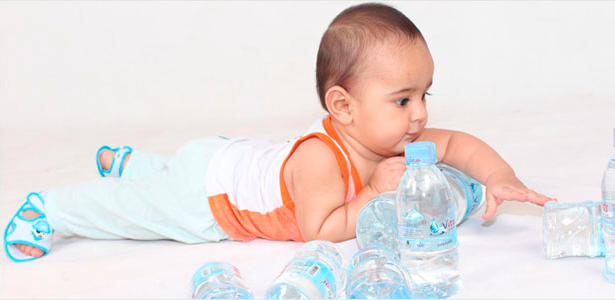
How much water should a child drink per day?
Water can be not only life-giving moisture: like any food product, in case of an overdose, the body can be oversaturated with it and suffer from intoxication. In the same way as its lack will lead to no less sad consequences - dehydration. Therefore, it is so important for parents to know how much water is recommended for children to drink. different ages pediatricians.
Why can't fresh milk be delivered until a year old, but if you prefer artificial "milk" to last? Many pediatricians recommend cow's milk after six months, diluted or not, but this is a mistake. There are two reasons, although the only certainty is that cow's milk is at risk of iron deficiency. Another reason is an excess of protein, because cow's milk has too many proteins. It is true that there is still no meta-analysis or systematic review on this subject, but we still need to collect more and more evidence from studies done in different groups.
- Children under six months
For children who are breastfed, 60-100 ml of baby water is sufficient at this age. An artificial child will need a larger amount - 100-150 ml.
- 6 months to 1 year
The body is growing, and it may no longer be enough of this amount of water at this age. He needs 50 ml of water per 1 kg of weight. But this also takes into account the volume of fluid that enters the small body with the rest of the food. For example, breast milk provides it with water by 75%. The average daily water requirement for children of this age can be calculated using the formula: LIQUID REQUIREMENTS (BABY WEIGHT x 50 ML) - FOOD WATER (DRINKED MILK x 0.75) For example, your baby weighs 10 kg and drinks about 500 ml of milk per day. First, we consider the baby's need for liquid: multiply 10 kg by 50 ml, you get 500 ml. Next, we find out how much water he has already consumed with milk: multiply 500 ml by 0.75, you get 375 ml. We calculate the difference: subtract 375 ml from 500 ml, we get 125 ml of water per day, your baby needs additionally. These calculations are individual and can be adjusted in each individual case.
However, the market is now giving differentiated formulas based on age. So why use cow's milk? Ongoing milk does not provide significant benefits over fresh modified homemade milk. Iron and vitamin fortification has recently been stigmatized by many parts of the international literature as being potentially dangerous. But what is the need, since cow's milk is recommended at weaning?
During this period, iron is guaranteed by meat, fish and eggs, among others, in a form that is certainly more favorable for absorption. It is true that when we introduce the elements of the body into the body, we do not know exactly what is happening in the body. In my opinion, however, the freshness of the product is not a sufficient criterion for preferring cow's milk to commercially available baby products for six months. Karman: It puzzles me that a fresh product is not considered the best industrial derivative, since the processing of cow's milk to produce finished milk leads to a complete loss of anything good in the simply heated milk of the House at 71 degrees.
- From 1 year to 3 years
The child is already moving on his own, becoming more active, and it is not worth limiting him to liquid if its amount is within 1–1.2 liters. Children should drink it in between meals, preferably before 18.00 in the evening: at night it is better to replace water with kefir, yogurt and even ordinary juice.
- 3 to 7 years old
The norm is 1.5-1.7 liters per day.
- 7 to 12 years old
The body of a child at this age should receive from 1.7 to 2 liters per day. If the drinking regime is organized correctly, the child will feel good, he will be active and drink water within the specified dosages. If a child categorically refuses to drink the right amount of life-giving moisture, you should not force him to do it without fail, if this does not affect his well-being in any way. But as soon as you notice signs of dehydration, the child will have to be forced to drink by any means. You can recognize the lack of water in the body of a child by the following signs :
- lethargy, irritability, capriciousness;
- practically no tears during crying;
- he begins to blink very rarely;
- eyes begin to sink;
- the skin becomes dry and pale, rough to the touch, loses elasticity, peeling appears;
- the tongue and mouth also become dry;
- the child urinates less often than usual, while the urine is stained in dark color and begins to exude a strong and not entirely pleasant smell;
- feces are very "cool", constipation becomes more frequent;
- more and more often, the baby has colic and bloating;
- the fontanel in babies begins to sink;
- atopic dermatitis;
- when you give the baby to drink, he eagerly grabs the cup (breast, bottle, etc.)
- if, against the background of some of these signs, after some time the child begins to vomit and diarrhea, a high temperature rises, this is dehydration of the body, with which, with such symptoms, you should consult a doctor as soon as possible.
The main points of introducing water into the drinking regimen of children have been considered, and now parents know whether it is possible to give water to a child, from what age and in what quantity.
The most important thing is not to put any experiments on your own baby in the first years of his life. There are certain rules developed by leading pediatricians, WHO and other organizations competent in these matters. Water plays very important role in the life of the child, but parents need to correct it and bring it under the main recommendations given by experts. Only in this way is it possible to maintain good health of a growing organism.
As you know, water is the main vital component of our body. Its role is huge: it removes toxins from the body, normalizes body temperature, participates in all metabolic processes and much more. But does a newborn baby really need it? And how to drink it? We will find out in the article.
For nine months, the baby is in the womb surrounded by amniotic fluid, which is 97% water. After birth, the amount of its content is reduced by only 10%. And many mothers have a question, is it possible to give a newborn water to drink?
Here opinions differ even among pediatricians.
Doctors of the World Health Organization are categorically against water supplementation if the child is breastfed, up to six months of age.
Our grandmothers say that it is necessary to give water to a newborn from the first days.
IMPORTANT: breast milk is 85% water, the remaining 15% is nutrients
Watering a newborn with water, if he is breastfeeding, definitely should not be done until 1.5-2 months, i.e. until the period when he began to try to actively move and his sweating increased.
It was at this time that it was not possible to quench the thirst of the child only with breast milk.
Why is it still impossible to drink a child from the first days?
- Firstly, the volume of the stomach of a newborn is very small, and after filling it with water, he will often begin to starve.
- Secondly, if you give a child water from a bottle, he may stop taking his mother's breast, because. sucking it requires effort.
- Thirdly, breast milk forms the microflora of the gastrointestinal tract of the newborn, water will only disrupt the natural process.
IMPORTANT: there are two exceptions to giving a newborn water while breastfeeding:
- before feeding, the mother ate salty, smoked or fatty foods
- the child began to hiccup (water relieves spasm from the diaphragm)
If the child is on artificial or mixed nutrition, he should be given water from the first days, on average from 100 to 200 ml per day. This is due to the increased protein content in the mixture.
IMPORTANT: with breastfeeding, artificial and mixed nutrition, give the baby water as needed. Don't force your child to drink.
When can you start giving water to a newborn baby?
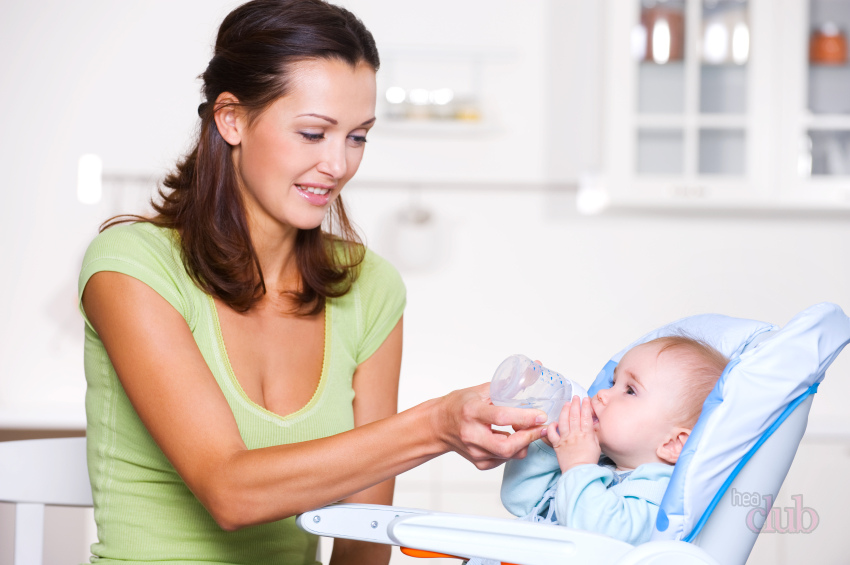
At the age of 2 to 5 months, you can start suggest water to a newborn breastfeeding baby, because. him physical activity increases.
Signs of lack of fluid in an infant
There are signs by which you can determine that the baby does not have enough fluid:
- Dry skin and oral mucosa
- Rare urination
- Urine dark with a pungent odor
Up to six months of age necessarily give a drink to a newborn if he has diarrhea (water compensates for the loss of fluid) and there is fever body. It is outdoors in hot weather or indoors with dry air.
IMPORTANT: if the child refuses to drink, then he does not need excess fluid.
After 6 months, it is necessary to give the child water to drink - this is due to the start of complementary foods.
How to properly feed a newborn?

It is recommended to drink a newborn with a spoon or with a syringe and pipette. You can also use a bottle with a pacifier, but according to some pediatricians, this way the child can lose the sucking reflex and refuse to breastfeed in the future. Which way to drink is up to the parents.
It is correct to give water to the child in the intervals between full feedings, so his hunger will be satisfied, or after, but in no case before them.
What water to drink a newborn?
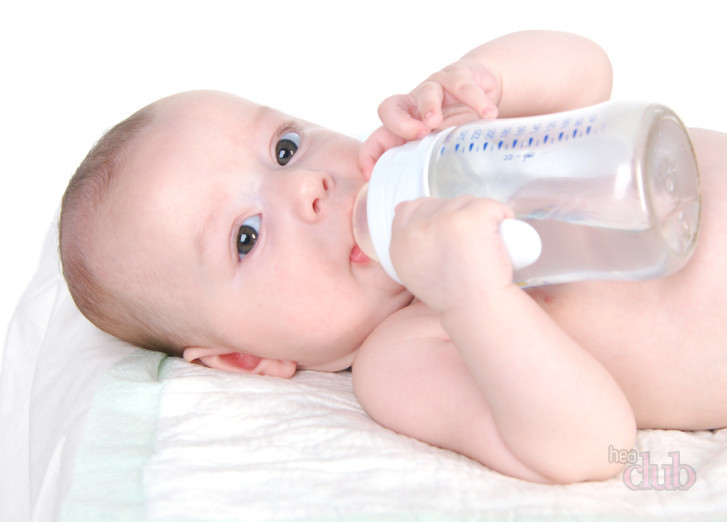
It is recommended to drink a newborn with special bottled baby water.. It contains all the necessary vitamins, macro- and microelements, and does not require additional purification. Water can be sweetened with fructose so that the baby drinks with pleasure.
From 4 months old, you can start drinking apple juice.
What can not drink a newborn?
- Carbonated water (promotes bloating)
- Sugar sweetened with water (promotes tooth decay)
- Raw or boiled tap water (may lead to intestinal infections)
IMPORTANT: the water temperature should be 23-25 degrees, room temperature, or slightly heated
Benefits of dill water: when to give dill water to a newborn?
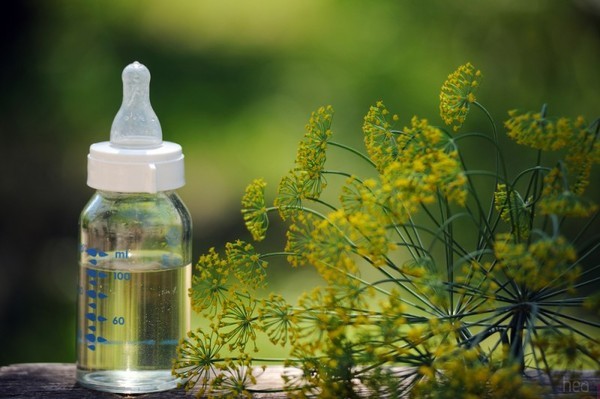
Dill water is an excellent remedy for children's colic and constipation. It relieves intestinal spasms caused by excessive gas formation, has a sedative effect, improves motility and promotes better bowel movement.
Recipe dill water : 1 tsp chopped fennel, pour 200 ml of boiling water and simmer for 15 minutes over low heat in a water bath. After that, strain the mixture and add boiled water to the original volume.
IMPORTANT: to avoid an allergic reaction, you need to start drinking dill water with 1 tsp. 3 times a day, increasing to 6 tsp.
How much should a newborn drink?
Water needs for each newborn are individual, they depend on his weight, age, weather conditions and general health.
On the advice of pediatricians, a child needs 100 ml of liquid per kilogram of his weight, given that this is not only pure water. On average, a child should drink no more than 120 ml. per day.
IMPORTANT: the child will determine how much water he needs
Is it okay to give raw water to a newborn?
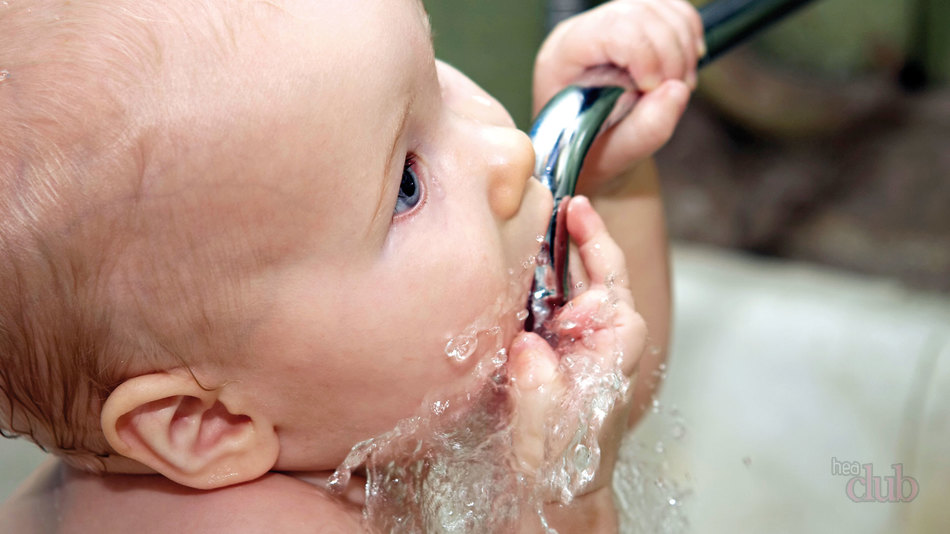
Raw tap water should not be given to a newborn, because. it contains pathogens and chemical elements (chlorine), which will only harm a small organism. A newborn can only be fed with raw water that has been deeply cleaned through a filter.
What to do if the newborn does not drink water?
In the case of breastfeeding, if the baby does not show signs of dehydration, the unequivocal answer is not to force him to drink.
With artificial feeding, start to give water gradually.
The child does not drink water well because it has no taste and smell.
Some parents use sweeteners, but this can lead to even more water rejection.
The best option is to give water between feedings when the baby is slightly hungry.
Cold or too warm water can cause you to stop drinking - change the temperature regime.
 Tips - how to teach to drink
Tips - how to teach to drink What advice on this issue exist, let's look at:
Tip #1: be an example for the baby, drink water yourself.
Tip #2: use "rhymes" when drinking, so the child will become interested in drinking water.
Tip #3: drink from a spoon or a bright drinker
When to water a newborn and in what way only parents decide. Monitor your child's condition and you will determine for yourself whether it is possible and necessary to start drinking water.
The most important thing is that the child should drink with desire.
Video. How to give a drink to a child if he does not want to drink?
